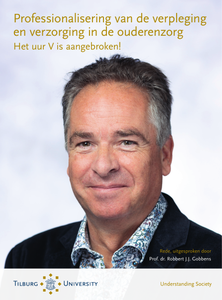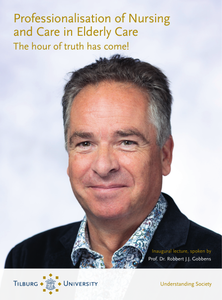Rede, uitgesproken bij de openbare aanvaarding van het ambt van bijzonder hoogleraar Professionalisering van de verpleging en verzorging in de ouderenzorg aan Tilburg University op 29 september 2023 door Prof. dr. Robbert J.J. Gobbens
DOCUMENT

Er zijn in dit onderzoeksproject drie onderzoeksvragen geformuleerd: • Wat is de aard en de omvang van onveiligheid in de thuiszorg onder medewerkers van Carinova in de divisie Verpleging & Verzorging? • Wat is de aard en de bron van onveiligheidsgevoelens bij thuiszorgmedewerkers in de divisie Verpleging & Verzorging van Carinova? • Welke maatregelen sluiten aan op de waargenomen onveiligheid en onveiligheidsgevoelens van medewerkers in de divisie Verpleging & Verzorging van Carinova? Zowel de fysieke als de sociale veiligheid in de thuiszorg is in vergelijking met de zorgsector niet ongunstig; alleen de fysieke belasting is relatief ongunstig. In vergelijking met beroepsgroepen in andere sectoren is de sociale onveiligheid groter in de thuiszorg, maar doorgaans lager dan in de overige zorgsector. Het geeft voldoende aanleiding om aandacht te schenken aan de manier waarop sociale veiligheid kan worden verbeterd.
MULTIFILE

Bijna alle verpleegkundigen en verzorgenden werken met dossiers die aansluiten bij (delen van) het verpleegkundig proces. Hoe hoger het opleidingsniveau, hoe positiever ze zijn over die verslaglegging. Ook over het gebruik van classificatiesystemen en gestructureerde zorgplannen zijn hbo-opgeleide verpleegkundigen positiever dan hun mbo-opgeleide collega’s. Dat blijkt uit onderzoek onder het NIVEL Panel Verpleging & Verzorging.
DOCUMENT

Mensen zorgen voor elkaar. En dat is altijd zo geweest. Zorg voor zieke familieleden is iets wat vanzelfsprekend behoort tot het privédomein van mensen. In de vorige eeuw is de zorg echter wel geprofessionaliseerd. Verpleging werd niet langer meer als naastenliefde gezien, maar als een beroep. In de huidige samenleving maken zorgvragers, mantelzorgers en professionals gezamenlijk deel uit van het zorglandschap. De nadruk wordt gelegd op zelfredzaamheid en zorg-verantwoordelijkheid van zorgvragers en mantelzorgers. Het lijkt alsof de overhead zich gedeeltelijk terug wil trekken uit de rol die ze in de vorige eeuw naar zich toe heeft getrokken.
DOCUMENT

Background Interprofessional education is promoted as a means of enhancing future collaborative practice in healthcare. We developed a learning activity in which undergraduate medical, nursing and allied healthcare students practice interprofessional collaboration during a student-led interprofessional team meeting. Design and delivery During their clinical rotation at a family physician’s practice, each medical student visits a frail elderly patient and prepares a care plan for the patient. At a student-led interprofessional team meeting, medical, nursing and allied healthcare students jointly review these care plans. Subsequently, participating students reflect on their interprofessional collaboration during the team meeting, both collectively and individually. Every 4 weeks, six interprofessional team meetings take place. Each team comprises 9–10 students from various healthcare professions, and meets once. To date an average of 360 medical and 360 nursing and allied healthcare students have participated in this course annually. Evaluation Students mostly reported positive experiences, including the opportunity to learn with, from and about other healthcare professions in the course of jointly reviewing care plans, and feeling collectively responsible for the care of the patients involved. Additionally, students reported a better understanding of the contextual factors at hand. The variety of patient cases, diversity of participating health professions, and the course material need improvement. Conclusion Students from participating institutions confirmed that attending a student-led interprofessional team meeting had enabled them to learn with, from and about other health professions in an active role. The use of real-life cases and the educational design contributed to the positive outcome of this interprofessional learning activity.
DOCUMENT

A B S T R A C T Background: Approximately 4 years ago a new concept of learning in practice called the ‘Learning and Innovation Network (LIN)’ was introduced in The Netherlands. To develop a definition of the LIN, to identify working elements of the LIN in order to provide a preliminary framework for evaluation, a concept analysis was conducted. Method: For the concept analysis, we adopted the method of Walker and Avant. We searched for relevant publications in the EBSCO host portal, grey literature and snowball searches, as well as Google internet searches and dictionary consults. Results: Compared to other forms of workplace learning, the LIN is in the centre of the research, education and practice triangle. The most important attributes of the LIN are social learning, innovation, daily practice, reflection and co-production. Often described antecedents are societal developments, such as increasing complexity of work, and time and space to learn. Frequently identified consequences are an attractive workplace, advancements of expertise of care professionals, innovations that endorse daily practice, improvement of quality of care and the integration of education and practice. Conclusions: Based on the results of the concept analysis, we describe the LIN as ‘a group of care professionals, students and an education representatives who come together in clinical practice and are all part of a learning and innovation community in nursing. They work together on practice-based projects in which they combine best practices, research evidence and client perspectives in order to innovate and improve quality of care and in which an integration of education, research and practice takes place’. We transferred the outcomes of the concept analysis to an input-throughput-output model that can be used as a preliminary framework for future research.
DOCUMENT

This paper is a report of a review conducted to provide an overview of the evidence in the literature on task-oriented training of stroke survivors and its relevance in daily nursing practice. Background: Stroke is the second leading cause of death and one of the leading causes of adult disability in the Western world. The use of neurodevelopmental treatment in the daily nursing care of stroke survivors does not improve clinical outcomes. Nurses are therefore exploring other forms of rehabilitation intervention, including task-oriented rehabilitation. Despite the growing number of studies showing evidence on task-oriented interventions, recommendations for daily nursing practice are lacking. A range of databases was searched to identify papers addressing taskoriented training in stroke rehabilitation, including Medline, CINAHL, Embase and the Cochrane Library of systematic reviews. Papers published in English between January 1996 and September 2007 were included. There were 42 papers in the final dataset, including nine systematic reviews. Review methods: The selected randomized controlled trials and systematic reviews were assessed for quality. Important characteristics and outcomes were extracted and summarized. Results: Studies of task-related training showed benefits for functional outcome compared with traditional therapies. Active use of task-oriented training with stroke survivors will lead to improvements in functional outcomes and overall healthrelated quality of life. Conclusion. Generally, task-oriented rehabilitation proved to be more effective. Many interventions are feasible for nurses and can be performed in a ward or at home. Nurses can and should play an important role in creating opportunities to practise meaningful functional tasks outside of regular therapy sessions.
DOCUMENT

DOCUMENT
Elsje Celestine Finck-Sanichar (1919-2001) is tot nu toe de enige Surinaamse verpleegkundige die de Florence Nightingale Medaille ontving. Kwaliteit stond voor haar voorop, daar was ze streng in.
LINK
Inaugural lecture, delivered upon public acceptance of the endowed professorship in Professionalisation of Nursing and Care in Elderly Care by Prof. Dr. Robbert J.J. Gobbens at Tilburg University on 29 September 2023.
DOCUMENT
